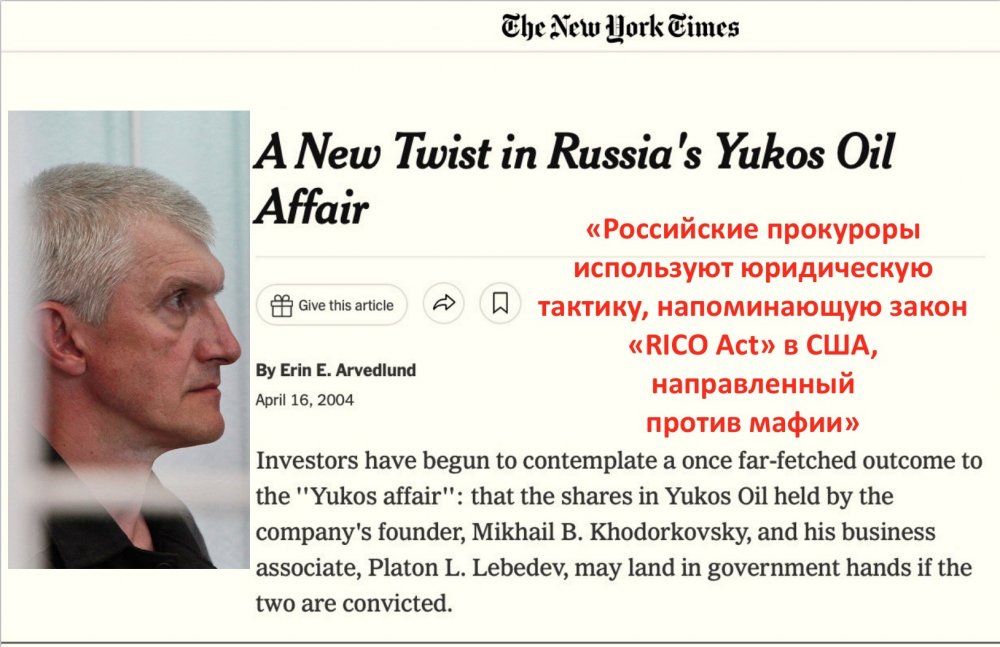
The tactic of the anti-mafia law “RICO Act” against swindlers from Yukos. Strasbourg does not change anything. The website prigovor.ru reminds its readers of what happened on April 16, 2004.
On this day, on April 16, 2004, foreign investors of Yukos, on the pages of the newspaper “The New York Times”, expressed their warries about “the outcome of the Yukos case”, which, on the eve, had not even passed in the Meschansky District Court of Moscow the stage of preliminary proceedings. It is apparent that “Western investors” were much more worried about the future of the company’s shares than about the “robber-barons” who turned out to be in prisoner’s dock.
“Investors started to think about the outcome of the “Yukos affair”: they were worried that the shares of Mikhail Khodorkovsky, the founder of the company, could end up in the hands of the Russian government, if the court adjudge him guilty”. “Mr. Lebedev’s first pretrial hearings took place on Thursday. If convicted, his assets, including his stake in Yukos, could be seized by the government, according to oil industry specialists”, pointed out anxiously in his column in “The New York Times” Erin E. Arvedlund. Moreover, the author said that “Menatep’s complicated structure could make it difficult to determine who owns what in Yukos”.
THE TACTICS OF THE LAW AGAINST MAFIA IN THE UNITED STATED
“Russian state prosecutors have laid out a case against Lebedev and Khodorkovsky as case that charges fraud, embezzlement and tax evasion, but as part of an “organized group”. “Russia state prosecutors are using a legal tactic somewhat similar to the RICO statutes in the United States. The law, first intended for the use against organized crime figures, was later used to prosecute financial fraud, resulting in long sentences and confiscation of assets”.
With his relative understanding of the scale of the criminal activity of Yukos leadership, the author, nevertheless, assumed “If convicted as an individual, Mr. Lebedev would face up to three years in jail. But convicted as a member of an “organized criminal group, he could serve up to 10 years. And the state could confiscate everything he owns, including Yukos stock”. “Mr. Lebedev is the fourth-largest holder in Yukos, and his total assets valued at $1.8, according to Forbes”, pointed out the newspaper.
(See also the article “On this day, an accusation formula was issued for Platon Lebedev”).
STRASBOURG DOES NOT CHANGE ANYTHING
On the same day, on April 16, 2004, in the Meschansky District Court of Moscow continued the pre-trial proceedings, which had been stopped because two Lebedev’s lawyers “did not put their signatures to the letter of accusation”. The technical problem was resolved. The proceedings continued. It was found out that Platon Lebedev “refused of the services of the lawyer Yevgeny Baru, as he is intended to authorize him to run the case in Strasbourg’s court”. “Lebedev made a long speech before the court trying to explain that he had not wanted his case to be considered in the European Court of Human Rights (ECtHR), but he had to address it, as all his complaints sent to the Office of the Prosecutor General and other agencies received no response”.
This statement of Lebedev, that “he had not wanted to send his complaint” to the ECtHR, sounded a bit cunningly, as Yelena Lipzer, a Lededev’s lawyer, persistently exploited the theme of Strasbourg, cultivating the myth that “Strasbourg will vindicate”.
“Quite recently, it became known to me that from the European Court of Human Rights came an answer indicating that the Lebedev’s case will be considered on a priority basis”, said on the eve the lawyer, as if this could change anything in the elements of the crimes imputed to Lebedev and those that the court have yet to consider.
“We would like to remind our readers that Strasbourg, finally, did not help the swindlers – the ECtHR did not recognize their case as “political”, notes the website Prigovor.ru.
(See the previous article “On this day, the government created the Oil Company Yukos”. “The firm “Laguna” paid for the shares with monetary means of clients and investees of the bank “Menatep”. Actually, Khodorkovsky stole the shares. The website Prigovor.ru reminds its reads of what happened on April 15, 1993, and 2003).